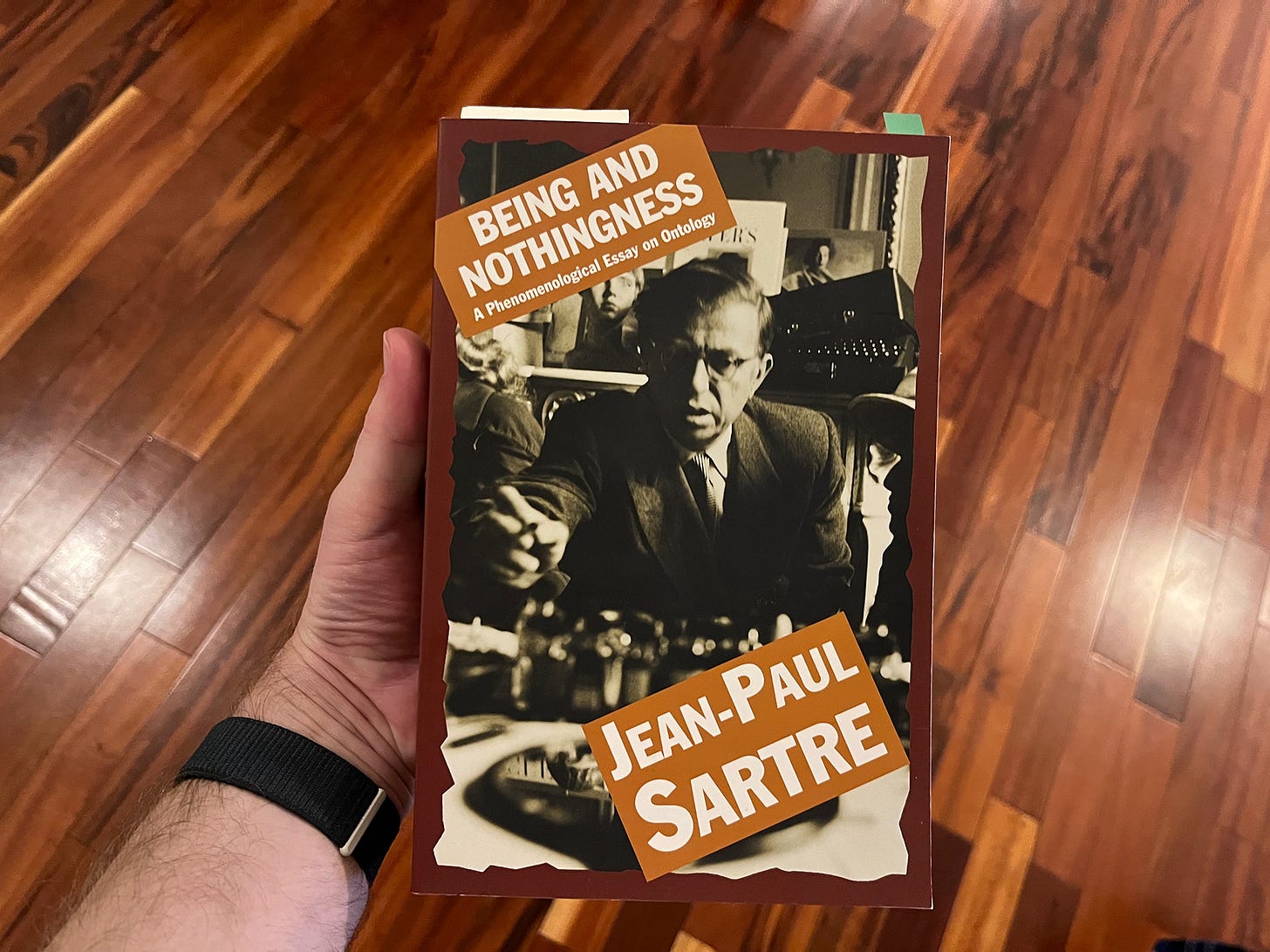Man Is Condemned To Be Free
Of all the philosophers I learned about in college, Jean-Paul Sartre terrified me most.
Studying philosophy and philosophers, by extension, is deeply satisfying for me, yet it’s also a complicated business for several reasons. I can think of at least four.
First of all, they’re usually dead. When we read them and study their work, they’re speaking to us from the grave. We can’t ask them questions or get them to expand on an idea they espoused during their lifetime.
So, unless someone else already thought of the question you’re thinking of, asked it during the philosopher’s lifetime, and recorded his or her answer, you can only wonder about how they would react to a given situation or ethical issue.
Second, they were—just like we are—a product of their culture and time. So, they often had certain assumptions or biases that might seem silly to us today.
Philosophy and science, for most of the history of Western civilization, went well together, except for the few times they didn’t.
Most philosophers until the Classical Greeks thought the Earth was flat, for example.
Most people (even doctors and scientists) throughout all of human history until the 17th century didn’t even know that germs existed. Still, into the mid-1800s, the cause of most diseases was unknown, so even medical professionals made all kinds of wacky statements about where sickness came from and proposed cures that were even wackier, that often cost people their lives rather than save them.
Third, another challenge is that thinkers from the past have already lived their lives, so it’s easy from where we sit now, with the fullness of our perspective, to judge them now, in what is our “present,” but their “future.”
Aristotle is probably the easiest to pick on in this regard. He did some amazing things, like laying the groundwork to prove that the Earth was round. But he also made some huge whoppers in his time, including:
Proposing a geocentric model for the universe (i.e., saying that Earth is the center of the universe). We now know for sure that this isn’t true.
Suggesting the Four Elements Theory: the idea that everything is made of Earth, fire, water, and air. We now know for sure there are at least 118 chemical elements that make up the universe.
Believing in spontaneous generation: like his contemporaries, he thought that animals came into existence spontaneously.
Again, we can look at all this now with the benefit of time and think: “That’s pretty silly.”
But these men were often making brilliant, educated guesses based on the knowledge they had at the time. They’re still impressive today in that regard.
A fourth problem with philosophy is that it’s hard not to judge a thinker by his or her actions and lifestyle. Martin Heidegger, for example, was a German existentialist with some interesting ideas… but he was also a literal member of the Nazi Party and a supporter of Adolf Hitler.
What does that mean in terms of his philosophical perspective? Just how much did the man’s political views and involvement taint his perspective as a thinker? How much of his philosophical work should we discard just based on that alone?
I’m not sure, but these are good questions.

The philosopher I remember most, and the one who made the biggest impact on me, was the Frenchman Jean-Paul Sartre, also an existentialist in Europe at the same time as Heidegger. They knew each other well, and their friendship ended up at odds later in life (mostly over the Nazi issue).
Sartre was a dense thinker: a man of many, many words, his book “Being and Nothingness: A Phenomenological Essay on Ontology” which clocks in at 546 pages, still sits on my bookshelf. I’ve skimmed parts of it, but I have yet to even get all the way through the first chapter many years after buying it.
But there is one thing he said that I think about all the time and haunts me because I know it’s true:
“We are left alone, without excuse. That is what I mean when I say that man is condemned to be free. Condemned, because he did not create himself, yet is nevertheless at liberty, and from the moment that he is thrown into this world he is responsible for everything he does.”
- Existentialism is a Humanism, Jean-Paul Sartre 1946
It’s weird to read a statement like this as an American living in America in 2024. Because Americans love the idea of “freedom” and “liberty” — both concepts he mentions here.
But Americans today are also in love with the idea that we are all victims of society: that we can’t act alone and can’t be held responsible for what we do. Even a criminal can’t be liable for committing crimes, the thought goes, because he’s just acting in a way that society has created him to be.
In 21st-century America, many people love the idea of victimhood. They can’t get enough of it: everybody is a victim of someone else’s actions, or their childhood, or the legal system, or a framework of systemic oppression, etc.
Today, the concept of personal responsibility is a harrowing thought for many. So Sartre’s view on the nature of man’s free will is, at first glance, an exceptionally American perspective. But upon further reflection, it’s rejected wholesale in the post-modern society that now runs the country.
Sartre is saying, at least in part, that you are not a victim, and you can never be a victim. No amount of oppression or claim of victimhood can remove you from being solely responsible for yourself.
Everything you do is your choice and yours alone, always.
I think, as an entrepreneur, some of this comes naturally to me. I like knowing that I am at liberty to do as I please. That’s part of why I have sought to “be my own boss.” But also, this is a truly terrifying thought: because if man is truly condemned to be free, that means that my circumstances are all of my own doing. I have no excuses for anything.
If I don’t make enough money, it’s my fault.
If my business struggles, it’s my fault.
If my sales are suffering, it’s my fault.
If a client is unhappy, it’s my fault.
If I fail, it’s my fault.
It’s always my fault, no matter what. There’s no escaping it.
The concept of “free will” in general has been a hotly debated topic in the past few decades, especially in Christian circles. The Neo-Calvinist movement has seemed to gobble up almost all the time devoted to debates amongst Christians in churches, seminaries, college campuses, and especially on the internet.
Arguments of “God’s sovereignty vs. Man’s free will” are so commonplace on social media they’re almost suffocating in their frequency.
The central issue of “free will,” both in philosophical and theological terms, was settled for me a long time ago. I’m on the side of Sartre in this regard. I think he’s right to observe that which is profoundly self-evident.
I do believe that man has free will, but that this is horrible news.
A lot of people who want to believe that man is completely free want to believe this because they feel it empowers them. It gives them autonomy and choice, which feels freeing. The idea that man has an ironclad will that is truly his own makes some men feel good about their ability to have free will.
For these men, “free” will is also “freeing.”
But for Sartre—and, as I said, I tend to agree with him—free will is anything but freeing. It’s the literal opposite.
Man is free, he says. He is free indeed, but he is condemned to be free.
This is not good news: it’s a sentence handed down by a judge in a courtroom. The legal system is telling you that you have free will, you have had free will, and that you are guilty, and this is all your fault.
I’m not impressed with Sartre as a person: he seemed like a selfish, lazy, drug-addled, lecherous drunk. But man, when it came right down to it, his pithy one-liner is just about the most profound observation I’ve ever encountered in the wild about the nature of man.
Man is condemned to be free. The best we can hope for is to use our freedom productively and stop making excuses.
This is part of what gets me out of bed in the morning and off to work. I am “responsible for everything I do,” and that’s a very sobering thought.



